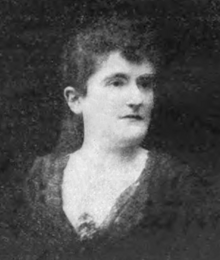Jeanne Marni
Jeanne Marni , Jean Marni, also Marni J. , Mme Marnière (born January 31, 1854 in Toulouse as Jeanne-Marie-Francoise Barousse , † January 6, 1910 in Cannes ) was a French writer. She wrote novels, theater and journalistic plays.
Life
Marni was born the daughter of a " femme de lettres " and was trained as an actress. In 1871 she married Victor Désiré Marnière. After his death in 1880, Marni began writing both plays and novels, which were not published until 1885.
She took up subjects that were unusual for a woman and writer of her time. Most of her work is psychological studies - analyzes of human passions. She had a large reading fan base in France. Her work has been published in Le National , Le Petit Journal , L'Écho de Paris and Le Journal . She was the editor of Femina magazine and a hard worker, consistently writing a number of pages per day. Because of her poor health, active life in Paris was difficult for her, and she kept moving back to her villa in Cannes, where she lived and worked nine months a year.
In March 1907 a journalist for the magazine Le Figaro described her : Jeanne Marni is completely different from the general idea we have of a literary woman. She is pretty, her cheeks are rosy, her eyes dreamy, her smile full of charm and her costume in a sober color and made of soft material. The most noticeable thing about her is that she is deeply cute and feminine, despite having gained a prominent place in contemporary literature. She is a good listener and consequently she learns many secrets of a confidential nature. Her intimate knowledge of the human heart has made her a cynical philosopher, but one without bitterness because she is endowed with an excellent sense of humor.
Works
Known under her pseudonym J. Marni, she wrote a number of very French contemporary novels. The best known are "La Femme de Silva", "L'Amour Coupable", "Papote", "La Princesse Sablina". Other works that have been translated into English and other languages are "Franchise", "Reaction", "Le Veilleur" and "La Piece do Vin".
A large number of one-act plays were also published: "L'Aile", "La Coopérative", "L'heureux Auteur", and two works that became more important: "Manoune" in 1901 and "Le Joug" in 1902 . In collaboration with Camille Mauclair she wrote a comedy "La Montée" and produced a series of dialogue scenes that had been brought into fashion by "Gyp" (pseudonym of Sibylle Gabrielle Riquetti de Mirabeau ) and Henri Lavedan , described in a series of short, concise, ironic lines a person or a situation. The titles were "Vacances", ".'Acquitté" and "Premier Jeudi".
In her novels, Marni boldly and cruelly reveals the weaknesses, cowardice and worries of the "eternally feminine". The audacity of her dramatic efforts delayed the success of her first novels: "La Femme (le Sylva)", "Amour coupable", "Comment elles se donnent", "Comment elles nous lz'lchent" and "Les Enfants qu'elles ont. "However, she only achieved her breakthrough as a novelist with the appearance of" Le Livre d'une amoureuse "and" Pierre Tisserand. "
literature
- Finch, Alison (August 10, 2000). Women's Writing in Nineteenth-Century France. Cambridge University Press. pp. 257-. ISBN 978-0-521-63186-0 .
- Waelti-Walters, Jennifer R. (1990). Feminist novelists of the Belle Epoque: love as a lifestyle. Indiana University Press. p. 189. ISBN 978-0-253-36300-8 .
Web links
| personal data | |
|---|---|
| SURNAME | Marni, Jeanne |
| ALTERNATIVE NAMES | J., Marni; Marnière, Mme; Barousse, Jeanne-Marie-Francoise (maiden name) |
| BRIEF DESCRIPTION | French writer |
| DATE OF BIRTH | January 31, 1854 |
| PLACE OF BIRTH | Toulouse |
| DATE OF DEATH | January 6, 1910 |
| Place of death | Cannes |

